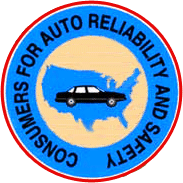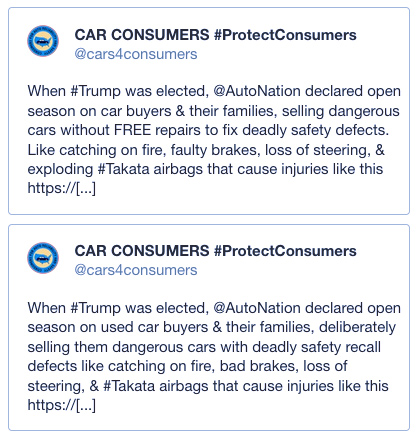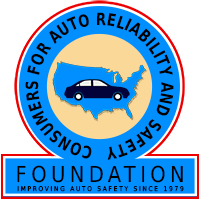CARS Exposes Car Dealers' Sales of Hazardous Unrepaired Recalled Vehicles
The President of CARS was interviewed numerous times over a period of months for this
Checkbook Magazine report "On the Road Again, Despite Dangerous Defects," contributing expertise and contacts for each of the consumers whose stories are featured, who were victimized by auto dealers who sold them dangerous unrepaired recalled used vehicles.
If a car dealer sold you an unrepaired recalled car, whether it was new or used, you may be able to get justice, if you are willing to fight back. Some consumers have received confidential settlements from dealers who sold them hazardous recalled used vehicles. To find out about your rights under the laws in your state, contact an attorney who specializes in auto fraud and warranty law, who is licensed to give legal advice. A good resource for finding an attorney who can advise you:
The National Association of Consumer Advocates.
"On the Road Again, Despite Dangerous Defects"
Checkbook Magazine
By Anthony Giorgianni
Last updated December, 2020
"Lisa Shelton of Hidden Valley Lake, Calif., fell in love with the black 2005 Infiniti FX35 on a used-car lot in June 2019. She purchased it for about $7,000, but she had no idea the SUV was one of more than 400,000 vehicles recalled by Nissan in May 2016. The problem: A passenger-side Takata airbag that could eject metal fragments during an accident, injuring her, her family, or others. And she didn't know that the potentially deadly airbag - never replaced by previous owners - remained installed in her car....
'I'm sick to my stomach,' said Shelton, who unknowingly put her daughters, husband, and self at risk while driving the car. She even taught her 17-year-old to drive in the Infiniti. 'I was completely blown away. I had no clue that was something I had to worry about.'
Colin Welsh, Shelton's attorney, said he doesn't know whether the dealer was aware of the outstanding recall, but that it had a responsibility to check before selling it. 'I think it's irresponsible and negligent for any dealer to sell a vehicle with an open recall.'
Think this is an unusual case? It's not.
Between 2010 and 2018, automakers in the U.S. recalled 238 million cars and light trucks due to unsafe defects. Manufacturers issue recalls for dangerous problems: Brakes that can fail, engines that can catch fire, airbags that injure or kill, doors that might fling open unexpectedly.
But according to the
National Highway Traffic Safety Administration (NHTSA), about one-fourth of recalled rides go unrepaired. Many end up on used-car lots where they're often resold by dealers that haven't addressed the recalls or informed buyers about them.
Checkbook and other consumer advocates say it's long overdue for this to change, and for state and federal agencies and lawmakers to take action to protect motorists, passengers, and the public.....
'Name another product that the retailer thinks it can sell you when it's under a recall,' said Rosemary Shahan, president of
Consumers for Auto Reliability and Safety. 'Dealers are in the business of selling cars, and they should make them safe. It's a threat to everybody.'
....
The car industry downplays the dangers of some recalls, but Jason Levine, executive director of the
Center for Auto Safety, says every recall should be taken seriously. 'There are only two reasons why a vehicle is recalled: A safety defect, or it's violating a safety standard,' he said.
Many people have been killed or injured or had their property damaged after buying vehicles with open recalls.
....
Many of the used vehicles we found on CarMax's website were promoted as "CarMax certified" after undergoing "an extensive reconditioning process to meet our high standards."
Apparently, CarMax's "high standards" allow "certification" of vehicles that, based on the open recalls we found, might catch fire, stall while traveling at high speed, or have airbags and seatbelts that might not properly deploy during an accident.
'The FTC violated its own mandate to protect the public by allowing false advertising for the safety of these vehicles,' said Shahan. She and other advocates said the FTC and states should use their existing laws to stop at least some of these sales (for example, disallowing ownership transfers of vehicles that don't meet federal safety standards due to unaddressed recalled defects).
Read more: Checkbook Magazine:
"On the Road Again, Despite Dangerous Defects"
As wildfires rage in California fueled by climate change,
CARS works to speed up switching from gas-guzzlers to newer, safer
Zero-emission electric vehicles
CARS is playing a major, pivotal role in working to win passage of legislation in California to make zero-emission electric vehicles more accessible and affordable, so consumers, businesses, and government agencies can access EVs via short-term memberships, freeing them from having to make large down payments or enter into risky, expensive long-term loans or leases.
This session, CARS worked closely with environmental group allies and the authors of
AB 326, championed by
Assemblymember Al Muratsuchi, and co-authored by Senators
Ben Allen and
Nancy Skinner, and Assemblymember
Phil Ting, who are known for being pro-environment leaders.
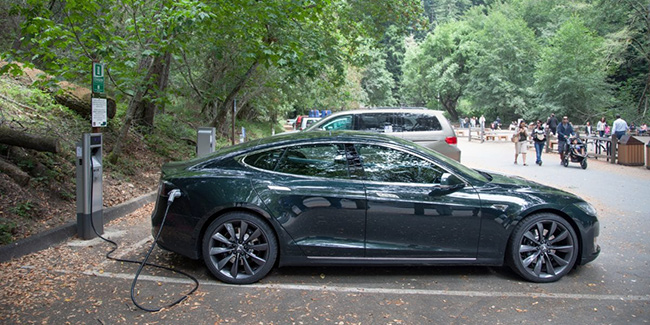
Pro-consumer, pro-environment legislation in California will speed up the switch from gas guzzlers to zero-emssion EVs.
CARS helped build a coalition to join in supporting AB 326, after negotiating successfully for many pro-consumer safeguards, winning support from CARS, and eventually also from the Consumer Attorneys of California, Consumer Action, CALPIRG, Housing and Economic Rights Advocates, and the California Reinvestment Coalition.
As CARS President Rosemary Shahan and Bill Magavern, Policy Director for the Coalition for Clean Air, wrote in an
op-ed published in CalMatters:
"A plan to expand access to electric vehicles"
"Consumer and environmental organizations are joining forces with electric vehicle manufacturers to support urgently needed legislation to allow California consumers to access zero-emission electric vehicles through innovative, affordable, short-term, renewable memberships.
Assemblymember Al Muratsuchi, Democrat from Torrence, and Sen. Ben Allen, Democrat from Santa Monica, are championing
Assembly Bill 326, which would establish a framework for 'Electric Vehicle Memberships' and provide easy access to EVs by allowing manufacturers to offer short-term memberships to consumers. The memberships will include registration, maintenance, charging and an insurance option, and provide a more affordable alternative to buying, leasing, or renting an electric vehicle – with no long-term financial commitment.
This legislation will also help overcome the car dealers’ near-total monopoly on sales of new vehicles – with the sole exception of Tesla – and provide California consumers, businesses and government agencies greater freedom of choice for accessing zero-emissions vehicles while also helping to ensure that this new, innovative EV membership model is regulated appropriately.
The EV industry has already created more than 275,000 jobs in California, and AB 326 will help preserve and grow jobs in that industry.
Furthermore, AB 326 will help Californians who struggle to afford a safer, more environmentally-friendly car and are faced only with options that include a high-interest loan. Particularly during the COVID-19 pandemic, with the ensuing economic uncertainty, business closures, job losses and unprecedented unemployment, many consumers are understandably risk-averse and leery of entering into long-term auto loans or leases.
Americans now carry more than $1.2 trillion in auto loan debt, an increase of over 75% since 2009. AB 326 opens up opportunities for more lower-income and disadvantaged consumers to break free from high-interest auto loans that are too often predatory or discriminatory, based on race.
In a recent
nationwide study conducted by Volvo Car and The Harris Poll, consumers cited the upfront cost of EVs as a leading barrier to entry. AB 326 helps remove that barrier by making it more affordable for more Californians to drive EVs through a month-to-month membership without expensive long-term loans or leases.
In addition to alleviating affordability woes, AB 326 will help remove the other prominent barrier keeping many would-be EV drivers from considering an EV – “range anxiety” – a consumer’s concern over whether the range they can drive between charges will fit their lifestyle.
AB 326 will allow Californians to have an “extended test drive” of an electric vehicle with no long-term commitment and no money down. We believe, as shown by the Volvo Car and The Harris Poll study, that once a consumer tries an EV, range anxiety tends to dissipate within a few months.
AB 326 is proposed at a critical time when EV tax credits are expiring and will help clean up our air without additional cost to the state.
For all of these reasons, a broad coalition of EV manufacturers, consumer groups and environmental organizations are working together to support the passage of AB 326. The new car dealers and traditional auto manufacturers are the only opponents of AB 326. Unfortunately, the car dealers seek to hold onto their near-total monopoly over new car sales and are notoriously resistant to competition. But Californians suffering from pollution cannot afford to wait until the dealers and traditional manufacturers get over their resistance to progress in making EVs more accessible.
AB 326 is the right thing to do – for the air we breathe and for creating more jobs in California during a pandemic and economic meltdown – and we need this pro-consumer, pro-safety, pro-environment legislation now more than ever."
AB 326 almost passed, but the car dealers and Chamber of Commerce opposed it, and killed it on the last night of the legislative session.
The need for this pro-consumer, pro-environment legislation to help address climate change is all the more obvious during the catastrophic fire season that is plaguing California and the rest of the West Coast.
We're going to keep fighting and are determined to win. There's no time to waste.
CARS fights to stop deadly defects from maiming and killing car owners and their families
Consumers for Auto Reliability and Safety is working for enactment of potentially lifesaving auto safety legislation in Congress. The pro-safety bills are championed by Senators Ed Markey (D-MA) and Richard Blumenthal (D-CT). If they are enacted, they will improve compliance with auto safety recalls, enhance reporting of serious defects, prevent distracted driving, and help stop deaths and injuries due to collapsing seat backs that kill babies, toddlers, and other children riding in the back seat -- even when they are buckled into child safety seats.
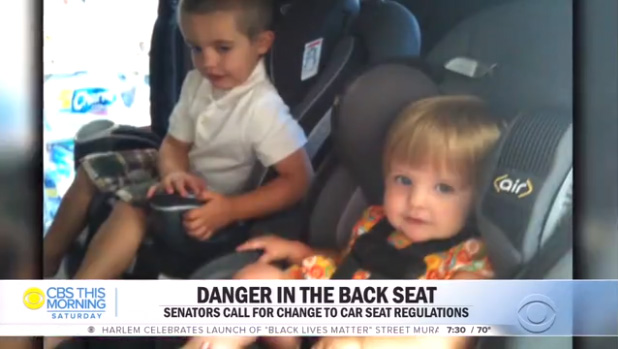
Taylor Grace Warner was only 17 months old when she was killed by a collapsing seat back.
"In 2019, an estimated 38,000 people lost their lives in car crashes, while over 4 million people were seriously injured,"
said Senator Markey. "These numbers repeat year after year and reveal a public health crisis that we must not accept as inevitable. We can prevent these unnecessary tragedies with proven strategies and technologies. That's why I am proud to introduce a robust legislative package that will address several of the most dangerous safety issues on our roads. As Congress debates infrastructure and surface transportation reauthorization, I will fight for these bills and ensure that safety is at the forefront of everything we do."
"Despite decades of auto safety advancements, it is still true that one of the most dangerous things you can do is get in a car,"
said Senator Blumenthal. "Senator Markey and I have partnered on a comprehensive package of legislation that will put safety back in the driver's seat - addressing dangerous auto recalls, defect investigations, distracted driving, and seat back standards. Any discussion of transportation programs must include steps to protect the lives of drivers and passengers, and these proposals are the right place to start.
The first bill – the
Promoting Auto Recalls Toward Safety (PARTS) Act – increases the speed and effectiveness of motor vehicle recalls in the wake of lessons learned from the infamous Takata recall. The PARTS Act will specifically authorize the U.S. Department of Transportation (DOT) to provide grants to states for use in notifying registered motor vehicle owners about manufacturer-issued safety recalls, as well as require additional reporting and an annual scorecard on how effectively automakers are completing any recalls.
A copy of the
PARTS Act can be found
HERE.
The second bill – the
Early Waning Reporting Systems Improvement Act – fills a safety gap created by the historically low number of defect investigations launched by the National Highway Traffic Safety Administration (NHTSA) in recent years. The legislation ensures that auto manufacturers will provide more information about incidents involving fatalities and serious injuries directly to the public. It will also require NHTSA to make the information it receives publicly available in a user-friendly format, so that consumers and independent safety experts can evaluate potential safety defects themselves.
A copy of the
Early Warning Reporting Systems Improvement Act can be found
HERE.
The third bill – the
Stay Aware for Everyone (SAFE) Act – tackles the threat of distracted driving; a problem that is only increasing with the proliferation of "driver assistance" technologies that can encourage complacency if misused on the road. The
SAFE Act will specifically require the DOT to study how driver-monitoring systems can prevent driver distraction, driver disengagement, automation complacency, and the foreseeable misuse of advanced driver-assist systems, as well as require a rulemaking to mandate the installation of driver-monitoring systems based on the results of this study.
A copy of the
SAFE Act can be found
HERE.
The fourth bill – the
Modernizing Seat Back Safety Act – addresses the thousands of preventable fatalities and life-threatening injuries that have occurred because of motor vehicle seat failure during a collision. The legislation will require NHTSA to update its standards for seat back integrity in new cars, an essential action that NHSTA has neglected to take for more than fifty years despite repeated horrific tragedies involving children and infants who were killed when the vehicles they are riding in are rear-ended, and the front seats collapsed on them.
Andy and Liz Warner and their children suffered a devastating loss when their daughter and sister, Taylor Grace Warner, was killed in 2010 at just 17 months old when the front seat of their family car collapsed on top of her when they were struck from behind.
"Tragically our family is not alone in experiencing this type of unthinkable loss,"
said the Warners. "Hundreds of children have been killed and many more have been seriously injured because of seat back failure. This could be prevented with action by the National Highway Traffic Safety Administration to update the safety standard, which this bill would require. Senators Markey and Blumenthal have been advocating for auto safety and supporting the cause for change in honor of our daughter and the others needlessly killed or injured. Our family thanks them for their leadership on this issue and urges Congress to pass this legislation."
A copy of the
Modernizing Seat Back Safety Act can be found
HERE.
All four bills have been endorsed by Advocates for Highway and Auto Safety, the Center for Auto Safety, Consumer Reports, Consumer Federation of America, the National Consumers League, Consumers for Auto Reliability and Safety, Safety Research and Strategies, Safe Roads Alliance, EndDD.org, and StopDistractions.org.
"Tragically, COVID-19 is not the only health and safety threat our nation faces,"
said Rosemary Shahan, President, Consumers for Auto Reliability and Safety. "We applaud Senators Markey and Blumenthal for continuing to champion protecting motorists and their families from deadly defects that claim precious lives."
Read more:
Senators Markey and Blumenthal champion auto safety legislation to reduce the carnage on America's roads
Working to Protect the Public from Hazardous Vehicles with Killer Safety Recall Defects
Seeking to overturn illegal, anti-consumer, anti-safety consent orders
Issued by the Federal Trade Commission
Consumers for Auto Reliability and Safety (CARS) is suing the Federal Trade Commission, seeking to overturn illegal, anti-consumer, anti-safety consent orders that the FTC entered into with General Motors, CarMax, Lithia, Koons, Asbury, and other large auto dealership chains, that allow them to advertise that vehicles they offer for sale are "safe," "repaired for safety," passed a rigorous inspection, and qualified to be sold as "certified" vehicles without getting the potentially lethal safety recall defects repaired, if the dealers merely provide a disclosure that the vehicles "MAY" have an "open recall."
The FTC itself admits that "Unrepaired auto recalls pose a serious threat to public safety...Car manufacturers and the National Highway Traffic Safety Administration have recalled tens of millions of vehicles in each of the last several years for defects that pose significant safety risks to consumers...In 2015, for example, recalls affected 51 million vehicles nationwide. And defects that have been the subject of recalls have led to severe injuries and even death for many consumers." (
Statement of the Federal Trade Commission Concerning Auto Recall Advertising Cases, December 15, 2016.)
CARS is joined in the litigation by the Center for Auto Safety and U.S. Public Interest Research Group (USPIRG).
Protecting Consumers from Dangerous Unrepaired Recalled Used Vehicles
CARS succeeded in winning fierce battles against car dealer-backed "license to kill" legislation in Massachusetts, New Jersey, and New York. The special-interest bills would have allowed auto dealers to get away with selling hazardous recalled used vehicles without getting the free repairs done first. If the bills had passed, instead of getting the deadly defects fixed, the dealers would have been allowed to merely "disclose" (in a stack of documents, in English only) that the vehicles had an open recall -- shifting legal liability onto victims.
CARS led the pro-consumer opposition, and organized coalitions of consumer, civil rights, and economic justice organizations in each state, to join in opposing the anti-consumer, anti-safety bills, and also alerted other national allies and spurred them to join in the fight. CARS hosted news conferences and reached out to media who covered the issue.
When New Jersey's legislature adjourned in mid-January, 2020, it was the fourth year CARS and our allies successfully defended that state's consumer protections against killer cars.
To defeat the "license to kill" bill in New Jersey, CARS worked closely with Alexander Brangman, one of the nation's leading auto safety advocates, whose daughter Jewel was killed by a Honda Civic with a recalled Takata airbag. CARS asked Alexander to file a
petition on Change.org. It took off and was soon signed by over 154,000 people. Alexander's petition said:
"I know the deadly results that can occur when profits are put over lives. An unrepaired recalled car killed my beautiful, talented, treasured daughter Jewel. She was just 26 years old, with a Master's Degree and preparing a plan for her Ph.D. at Stanford. A gifted gymnast, gymnastics teacher, and model, Jewel was full of life, and devoted to making the world a better place. After receiving her doctorate degree, she intended to write children's books and open her own family therapy practice.

Alexander Brangman raised Jewel as a single parent, and they were especially close. The day she died, Jewel sent her father the last text he ever received from her. It said, 'I love my life, Dad.'
But almost exactly four years ago, she was in a fender-bender with several other cars. Everyone else walked away, and her rental car was not badly damaged, but a defective recalled Takata airbag exploded, like a hand grenade going off in the car, propelling metal fragments that sliced an artery in her neck, and she bled to death.
My whole world changed. Now I am on a mission to honor Jewel and her life, by saving the lives of others endangered by the more than 57 million unrepaired recalled cars on America's roads. No one else should have to suffer such a horrendous loss, which is why I need your help to tell lawmakers that dangerous recalled cars don't belong on the road.
It's truly shocking, but car dealers in New Jersey are attempting to eliminate consumer protections in their state, so they can get away with selling cars with deadly safety defects like the ticking timebomb airbag that claimed my daughter's life. The owners of a mega-dealership conglomerate contributed over $500,000 to a PAC before the election last November, and now the powerful Assembly Speaker, Craig Coughlin and Assemblymember Louis Greenwald are authoring the car dealers' bill, AB 4292.
I am fighting back, because I believe that everyone who buys a car from a licensed car dealership deserves to get a vehicle that is at least safe to drive, even if they can't afford to buy a car that is brand new, or they simply prefer to buy one that is used. You shouldn't have to worry about dealers charging you top dollar for a car that is hazardous, with life-threatening defects like catching on fire, steering loss, sticking accelerator pedals, brake failure, or exploding Takata airbags.
Leading national and statewide consumer, safety, civil rights, and environmental groups are also fighting back. Plus, the citizens of New Jersey are on our side in this fight. Polling shows that likely voters in New Jersey overwhelmingly oppose changing the laws in their state to allow car dealers to get away with selling dangerous recalled used cars, with or without "disclosure" that merely shifts legal liability onto victims.
It would be a federal crime to sell cars with the same defects, as new cars. They certainly aren't any safer when they are used. Precious lives are at stake. Not only the lives of car buyers, but also their families and other passengers, and others who share the roads.
Please, join me in calling on New Jersey Assemblymen Coughlin and Greenwald to withdraw the car dealers' "license to kill" legislation, before someone else's daughter or other loved one is seriously injured or killed."
As Alexander wrote,
statewide polling in New Jersey found that over 90% of likely voters opposed allowing car dealers to sell dangerous unrepaired recalled used vehicles. Even higher percentages opposed allowing dealers to sell those vehicles when the recalls are due to faulty brakes, loss of steering, or exploding airbags that send metal fragments at the driver or passenger's face and neck, causing blindness and death.
Polling in
Florida,
Massachusetts,
Maryland, California, and other states found similar results.
Read more: USA Today report:
"Used car dealers didn't want to fix deadly defects so they wrote a law to avoid it"
Stay tuned!
